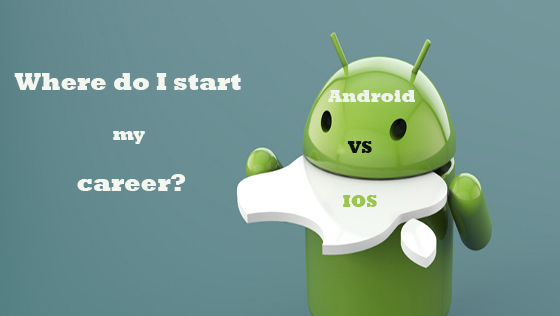IOS vs Android where do I start?
 We are going to continue with the confrontation between the two mobile operating systems, we have seen from different perspectives, this time we will do so from the point of view of a developer.
We are going to continue with the confrontation between the two mobile operating systems, we have seen from different perspectives, this time we will do so from the point of view of a developer.
The first thing is to analyze each one of the environments and examine the pros and cons. To decide we attend to personal criteria do I want to gain the maximum amount of money? Do I Want to reach a larger number of people? Do you schedule in a large community? How to succeed with the girls? (Leave your computer and go to the gym).
I will try to be as neutral as possible, on the one hand I love the Android devices, upload your application and have it available for millions of people in a matter of seconds is simply great. On the other hand, we have mobile devices from Apple, with a spectacular design, a good response and that I could use my grandmother in a few hours of learning.
We will evaluate the following sections: accessibility, learning, memory management, documentation and other issues.
- Accessibility
At this point we have a clear winner: Android. To write a line in iOS and that serve to something, there is a need for a Mac. Once you have a Mac…if you have the latest version of the Mac OS, you can download the latest Xcode. Otherwise, you will have to pay. However, Eclipse is available on Mac, Linux and W indows and you can install the SDK on any of those platforms. There are number of individuals has completed Android Training in Chennai to switch their career as Android developer.
On the other hand, IOS is linked to the Apple devices, Android is adaptable by manufacturers and therefore accessible through a wide range of devices and prices. IOS is not available in all companies; in addition, not everyone can afford to spend the money to buy an iPhone or iPad. Android is facing a massive audience. So there is a demand for the IOS developer in mobile application development, candidates who learn IOS Training in Chennai can get delightful chances now.
- Learning Curve: Java vs Objective-C.
Java is a programming language very well known, therefore in Android can be a base already acquired.
Android, between developers, is more competitive, because you can extrapolate the knowledge quickly. When there is a lot of something happens which lowers its value and has lower wages. Unless you have done some development of Mac or IOS, you do not know Objective-C, so the learning curve for IOS is greater in most cases.
Superficially, Objective C and Java have a certain resemblance. Both languages have a syntax inspired in C, and the two languages share most of the primitive types. However, Objective C and Java have fundamental differences:
– The Java community is large. For example, there are many books on Java.
– Java uses static typing, while Objective-C promotes the dynamic typing.
– Objective-C has all the characteristics of low level of C
In summary, while Objective-C has its advantages, the cultural strengths and practices of Java are greater.
- Memory Management.
Many developers Android assert that the management of memory in IOS consumes a lot of time by the “garbage collection” manual. Android tells you: do not worry about the garbage.
The locks changed in the IOS 5 (there were other solutions inefficient previously), has something much better than a garbage collector: has an Automatic Reference Counting (ARC). The garbage collector uses some of the hardware resources. ARC, on the other hand, is a compiler feature LLVM. With ARC enabled, the compiler uses the rules to insert the logic of memory management in the code of the app during compilation. The concept behind ARC is that developers write less code without sacrificing performance.
The hardware resources (memory, disk space, power the CPU) on mobile devices have always been limited. I personally prefer the manual management of resources and in Objective-C is very easy, therefore I would say that IOS wins in this aspect
Documentation
Google and Apple have come with documentation ideal for their platforms. However, it sometimes seems that the collections of sample code are insufficient for both operating systems. Personally I have no complaint large about the documentation for any of the operating systems. For IOS it is very difficult to find something when you want to go a little beyond. Android has a greater amount of sample code that IOS. Surely has to do with the philosophy of the system and by extension of its developers.
Conclusion
What platform is better? It is difficult to say. Android has a larger share of the market, but with IOS earn more money and increase your chances of linking. Whether your interest must be taking Android Training or IOS Training, both give you the same value for your career improvement.
